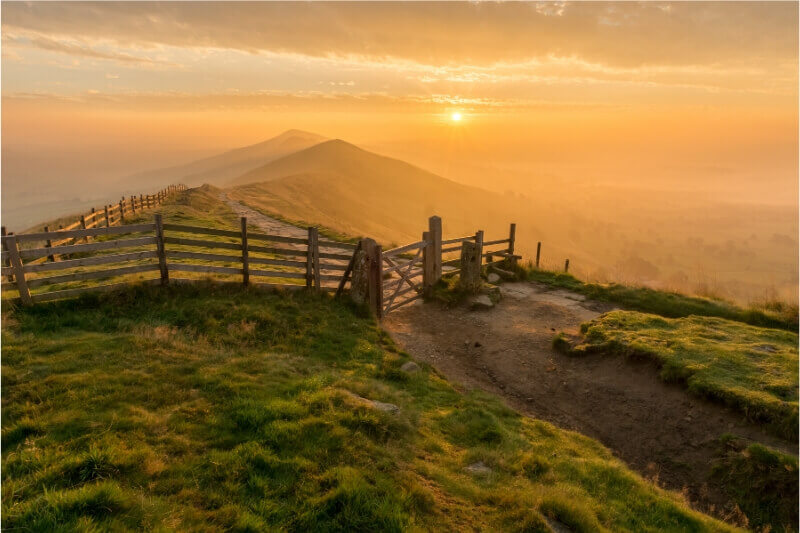Over the years, I’ve made some useful discoveries. One is that long walks help my mood, and give me a good base for my fitness. Another is that there’s a happy band of volunteers who make walking a more accessible exercise. They’re called The Long Distance Walking Association (LDWA). And if you live in England, Wales or southern Scotland, you can tap into their energy and enthusiasm.
Both discoveries are important, because walking could be our most under-rated exercise. Yes, runners get to strengthen their leg muscles with more force and more speed. But walking has a lower impact, so you can be out and about for longer. It’s a good choice for those looking to lose weight, or anyone with knee, ankle and back problems.
The LDWA do a brilliant job of organising walking events, often on our doorsteps. Its members share an interest in covering distances over 20 miles in their local countryside, moorland or mountains. The fittest test themselves with challenge events up to 100 miles, which also cater for runners. Others plan long routes over several days, or get together for day walks with one of dozens of groups across the country.
The support of a group means a lot, especially if you’re someone who’s uneasy about heading out alone. Some of my clients are unfamiliar with the countryside, or worry about navigating public footpaths and five-bar gates. Others are nervous about hazards, because they’ve heard tall tales about wayward cattle and farmyard dogs. With the LDWA social walks, everyone is together, with an experienced leader. So you don’t need to worry about getting lost or feeling unsafe.
Being in a group also brings a like-mindedness that many walkers enjoy. The shared goal gives a purpose to the day, but with no pressure. The rhythm of a walk sees you naturally fall in and out of conversation with interesting people at different times. Sometimes that companion will be you, as you find yourself alone with your thoughts. It’s here that we find some of the mental health benefits of long-distance walking.
During my education as a personal trainer, I’ve seen many studies showing that walking in nature is good for us. There’s something about it that helps our minds stop going over negative experiences. That cuts down negative emotions (like fear and anxiety), and the risks of depression.
Perhaps walking makes us feel good thanks to an imprint from our evolutionary past. Or it may simply be that our brain is being gently distracted by clouds, trees, mud and the birds singing. That’s a lot less stressful than commuting or a beeping smartphone.
This boost in mood comes with some extra benefits, too. As our legs cover the ground, our minds wander. We’re drawn into a more creative state. This is why we often associate walking with new ideas and problem-solving. There’s a nice-sounding Latin phrase for this. ‘Solvitur ambulando’ means ‘it is solved by walking around’. The travel writer Paul Theroux writes about this in his book, The Tao of Travel.
I first got in touch with the LDWA when preparing to run the Pennine Way. Their advice was invaluable, especially for the Northumberland Moors and the area around the Whin Sill Ridge (the home of Hadrian’s Wall). I’ve now completed a number of their tough endurance events as a runner, including the Goyt Valley Challenge, the Winter Tanners, and Roundhay – a 50-miler in Yorkshire. I’ve got some great memories of how well-run these were and the quality of organisation at the checkpoints. With endless tea and cake, these events really have a supportive ‘parkrun’ atmosphere.
If the walking bug gets you too, you might want to expand your horizons and enter events like these. They may sound tough now. But the transition from walking for an hour to walking all day is within reach of most of my clients. As you build the habit and improve your physical and mental stamina, longer distances feel natural.
You’ll also start to learn about routes near you, and the glorious long-distance paths you can explore both here and overseas. LDWA members often have a deep knowledge of the countryside they’re very happy to share. Their challenge events are also suitable for advanced athletes, who may choose to race them. My Army colleagues have often been surprised to discover what the LDWA can offer their training programmes, including a unique database of route maps for walks on their website.
For many members, their ambition is to complete the annual 100-mile event held on the last bank holiday of May. Entrants have 48 hrs to complete it. Sadly this year’s 100 in Monmouthshire, organised by the South Wales LDWA team, had to be postponed due to COVID. But it will be back next year.
Membership of the LDWA is only £18 a year, £15 by direct debit and families £22.50. Their challenge events usually cost around £10. That’s exceptional value, especially when you compare them to city centre running events at £40+. At the time of writing, due to the national lockdown all group walks have been suspended due to coronavirus. Virtual events are still being held. Please check the LDWA website for the latest information.
Find out more:


